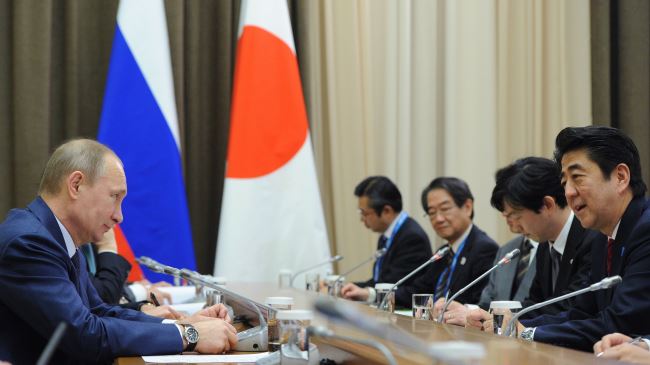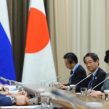
Russo-Japanese Ties Remain a Casualty of War With Ukraine
Publication: Eurasia Daily Monitor Volume: 11 Issue: 175
By:

Russian ties with Japan have clearly suffered serious damage due to Moscow’s aggression against Ukraine. Apparently, there will not be a visit by Russian President Putin to Japan anytime soon, despite previous wishes for such a trip by both sides (Asahi Shimbun AJW, September 24). Instead, Prime Minister Abe will meet with Putin at the annual Asia-Pacific Economic Cooperation (APEC) conference, next month (November 2014), in Beijing. Moreover, Japan has, albeit with visible reluctance, imposed new sanctions on Russia. It will restrict weapons exports and other items for military use and arms technology as well as ban five Russian banks from issuing securities in Japan (Xinhua, September 24, 2014).
In other signs of a slowdown in Russo-Japanese relations, Tokyo Gas is now delaying the signing of a purchase agreement with Russia for liquefied natural gas (LNG). Tokyo Gas claims that it first needs to study the impact of sanctions before committing itself. However, it seems that politics is indeed a factor here, as is generally the case with major Japanese companies’ investments in Russia (Interfax, September 24).
Predictably, Russia reacted negatively—although not with the same level of scorn it has shown to Europe. This, in itself, indicates that Putin wants to keep the door open to normalizing ties with Japan, however difficult that has now become due—almost exclusively—to Russian actions. Nevertheless, this factor has not inhibited the Russian Ministry of Foreign Affairs from slamming Tokyo’s actions.
Japan had clearly indicated that it was imposing these new sanctions—which are far less ambitious than Western ones—to remain in solidarity with its partners in the G-7. But, Moscow saw this caution coming from Tokyo as weakness (China Daily Online, September 24). The Russian foreign ministry stated its “disappointment” with Japan’s decision to impose sanctions despite the agreements on a ceasefire in Ukraine that were reached in Minsk earlier in September. Furthermore, the ministry raised the question of whether Tokyo really wants to facilitate a rapprochement with Russia. Since sanctions are, according to Russia, illegal, clearly Japan is damaging its chances for normalizing bilateral ties Russia, the foreign ministry statement claimed (mid.ru, September 24).
Beyond this veiled threat, the foreign ministry also stated that it regarded this “unfriendly step […] as another indication of Japan’s inability to pursue an independent foreign policy” (Interfax, September 24). This line of attack clearly reflects the “Japan-bashers” in the Russian government who see everyone but Moscow, Beijing and Washington as not really sovereign actors in the Asia-Pacific region. Consequently, they regularly deprecate Japan as being controlled by the United States and, therefore, of relatively less importance for Russia as a possible partner. Such thinking leads to conclusions by the “Japan-bashers” in Moscow that Russia need not pursue rapprochement with Japan, even if it might be desirable—especially since “Washington-controlled” Tokyo is also ultimately unwilling to move in Russia’s direction.
While Putin apparently remains willing to talk to Japan, the Russian government is displaying clear signs of its readiness to disregard Japanese interests—for example, by opening a new airport on Etoforu in the disputed Kuril Islands/Northern Territories, not coincidentally on an abandoned Japanese airport. While both Abe and Putin would most likely prefer to move bilateral relations forward, it is also abundantly clear that either or both of them will have to overlook their disagreements over dividing issues like Ukraine for a true rapprochement and normalization to happen. In other words, they may have to impose these supposed preferences upon their governments and disregard other costs: Japan’s need for solidarity with its allies, previous Russo-Japanese discord, and the fact that Russia’s growing intimacy and dependence on China restricts its freedom of maneuver vis-à-vis Japan (Nikkei Asian Review, September 23).
This will be a tall order given the pressures on both sides to entrench and remain where they are, and the fact that Russia is increasingly unable to deliver to Japan what it wants—progress on the Kurils and expanding investment opportunities in Russia as the Russian economy grows ever more protectionist and autarkic. And along with these considerations there are strong domestic pressures inside Russia to stay its present political course as well as inside Japan to maintain solidarity with the West, especially as it continually needs US backing against China. Overall, therefore, it appears that a political process is underway wherein Moscow and Tokyo are, once against, missing opportunities to break the impasse in their relations. But this time, one can ascribe the fault pretty much exclusively to Moscow. As such, Moscow may need to ask itself whether seizing Crimea and eastern Ukraine was worth losing the decisive race for true great-power standing and economic development in Asia and the Pacific.




